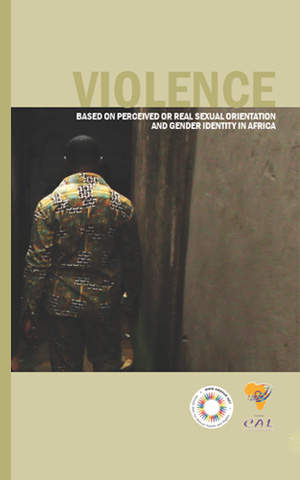Violence based on perceived or real sexual orientation and gender itentity in Africa
Edited by CALS (Coalition of African Lesbians) and AMSHeR (African Men for Sexual Health and Rights)
2013
Pages: 57
Print version: Available
Electronic version: Free PDF available
About the publication
Violence against sexual minorities in Africa is rife. Persons belonging to or perceived to be members of the broad grouping ‘lesbian, gay, bisexual, transgender and intersex (LGBTI)’ are often victim of violence in African states. This violence is sometimes perpetrated by state actors, such as the members of the Police force, and more often by ordinary persons (non-state actors). By condoning violence by state actors, and by failing to diligently investigate, prosecute and punish the perpetrators of these acts, states fail to respect the basic right to security of some of its citizens. By condoning these actions, or by failing to act effectively, the state also violates its human rights obligations. The argument of this report is not that sexual minorities deserve special protection, but that they are entitled to the rights all other citizens have – the right to security, liberty, life, dignity, and a fair trial.
As members of the African Union, states are party to and should abide by their obligations under the African Charter on Human and Peoples’ Rights (African Charter). Like several other regional and international human rights instruments, the African Charter guarantees freedom from discrimination, and equal protection and equality of individuals and peoples’ before the law (articles 2, 3 and 19). The African Commission on Human and Peoples’ Rights (African Commission), the body monitoring compliance with the African Charter, has in various communications presented to it denounced acts of discrimination on several of the listed grounds of discrimination and has clearly established that ‘other status’ (in article 2 of the Charter) can be broadly interpreted to include grounds other than those explicitly listed under that provision of the African Charter. The Commission made its first pronouncement on sexual orientation and gender identity (SOGI) issues in its Concluding Observations on Cameroon’s periodic report of 2005 by expressing concern about the upsurge in intolerance towards sexual minorities. Most recently, the Chairperson of the Commission issued a statement on in April 2013 stating that the Commission ‘equally denounces violence committed against individuals based on their sexual orientation as part of its mandate to protect individuals from all forms of violence’.
About the editors:
The Coalition of African Lesbians [CAL] is a formation of more than 30 organisations in 19 countries in Africa committed to advancing justice for lesbian and bisexual women and transdiverse people.
The African Men for Sexual Health and Rights (AMSHeR) is a coalition of 18 LGBT/MSM-led organisations across sub-Saharan Africa established in 2009 and working to (1) address the disproportionate effect of the HIV epidemic on MSM and LGBT individuals; (2) to redress the human rights violations these populations face on the continent; (3) and to increase the visibility of LGBT individuals and their issues. AMSHeR was formed in an attempt to devise ‘home-grown’ strategies to address local issues.
Table of Contents
Abbreviations
Glossary
Executive summary
Introduction
- Debunking the myth - homosexuality as a foreign concept
1. Forms of violence
1.1 Arbitrary arrest and detention
1.2 Physical violence including rape and murder
1.3 Harassment and threats of violence
1.4 Extortion and blackmail - Factors fuelling violence against LGBTI individuals
2.1 Criminalisation of same sex behaviour and incidences of violence
2.2 Incitement to violence by political leaders
2.3 Negative media reporting - Impacts of violence
3.1 Difficulty in accessing health care services for HIV and sexually transmitted diseases
3.2 Increase in the number of asylum seekers
3.3 Other forms of impact - Conclusion and recommendations
4.1 Recommendations to the African Commission on Human and Peoples’ Rights
4.2 Recommendations to member states
Keywords:
